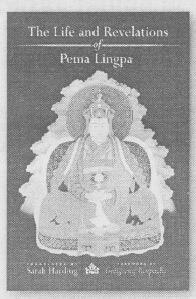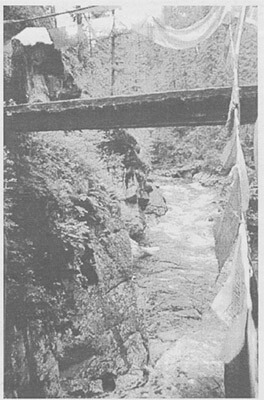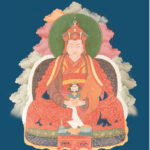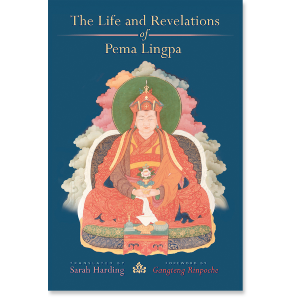| The following article is from the Summer, 2003 issue of the Snow Lion Newsletter and is for historical reference only. You can see this in context of the original newsletter here. |

"An amazing and precious gift...a masterpiece on the Dzogchen teachings."—TULKU THUBTEN RINPOCHE
"A wonderful job...A true gem of a book."—PROF. STEVEN GOODMAN, Asian Studies, CIIS
These fascinating discussions between 11th century court ladies and the great master Padmasambhava, available for the first time in English, weave intriguing issues of gender into Buddhist teachings. The women's doubts and hesitations are masterfully resolved in these impassioned exchanges. The wonderful material in this book is part of a terma (treasure) revealed by Pema Lingpa (1450-1521), the greatest terton (treasure-revealer) of the Himalayan kingdom of Bhutan. This pithy collection is rounded out by Pema Lingpa's astonishing life story. All in all a beautifully realized book, translated and compiled by the author of Machik's Complete Explanation.
The following excerpts are taken from The Life and Revelations of Pema Lingpa, translated by Sarah Harding.

From the life of Pema Lingpa describing his discovery of the treasures of The Burning Lake
In particular, on the tenth day of the first month of autumn in the Fire Monkey year (1476), while staying at the monastery in a deep state of melancholy, [Pema Lingpa] went alone up into the woods to look for mushrooms. Not finding any, he turned back and fell asleep at the foot of the chapel room in front of the monastery. Hearing Get up and work! he looked around. Standing close by was a monk in ragged robes. After much questioning, the monk handed him a paper scroll and said, "Look well, and give me some food." After preparing the food inside, Pema Lingpa again went outside to call the monk, but he had disappeared without a trace. Looking at the paper scroll, he read, "On the night of the full moon of this month, at the bottom of your there is a place called Naring Drak (Long-Nosed Cliff). There lies your destined wealth. Take five friends and go there to retrieve it." When he got home, he showed the scroll to his father and mother and Ani Deshek, explaining the situation. His father said. "It's a lie," but Ani said, "This same thing happened before to Ratna Lingpa. How do we know what it is?" Basically, they didn't believe in it.
On the night of the full moon, Pema Lingpa persuaded five friends to come with him. Unwilling, they pretended that they were first going to fetch a yak cow from Tangsibi, and they tried to confuse him by acting as if they would come to meet him. In the lower part of Chel, the Tang River twists and knots at the place called Senge Naring Drak (Long-Nosed Lion Cliff), or Mebartso (Burning Lake). When Pema Lingpa arrived at its edge, immediately an intense experience of having lost all bearings welled up in him, and he took off his clothes and jumped in the water. Beneath the water, in a place called Palgyi Phukring (Glorious Long Cave) there was a life-size figure of the Teacher. To the left side of this was a stack of many rhinoceros-skin chests. A woman with one eye, wearing maroon clothes, handed him a treasure box from among these containing the text of The Quintessence of the Mysteries of the Luminous Space of Samantabhadri. After somehow being propelled back onto the cliff, he returned with his friends at midnight. He blessed his mother, father, and others with the treasure.

Rest in the continuity of whatever arises, I without grasping. The one who thus rests is also empty of essence, like ice melting in water. If you abide in this state without any frame of reference, the I experiences of bliss, I clarity, and nonthought will arise.
Back at Mani Gonpa, when it was time to transcribe the yellow scroll, the ink ran out. Immediately a dakini appeared and offered a self-filling pot of ink and made a prophecy about the scribe and other things. At the village of Dangkhabi, when he opened the door of the empowerment and instruction of this sacred teaching for the first time, myriad good signs appeared, such as a rain of flowers and a canopy of rainbows. Every night he experienced the Great Orgyen and Tsogyal explaining the exact details of how to confer the empowerment and give the instructions, how to perform the dances, the musical notation for the ritual activity, and so on, and he would precisely implement these instructions on the following day.
One time, on the fifteenth of the month, Pema Lingpa fell asleep on the steps of a stupa. The awareness-holder Ratna Lingpa appeared to him and said, "You have acted as the lama for three lifetimes. I am going to Chamara, and you must stay to benefit sentient beings." He then disappeared like a rainbow. Later Pema Lingpa found out that Ratna Lingpa had died on that very day.
On the fourteenth day of the eighth month of that year, in the midst of a large crowd who were gathered at the edge of Mebartso, Pema Lingpa held up a butter lamp in his hand and declared, "If I am a demonic emanation, then may I die in these waters. If I am a son of Orgyen, then may I find the necessary treasure and may this butter lamp not be extinguished."
Saying that, he jumped. The people had all kinds of reactions and a great clamor arose, but immediately thereupon the figure of Pema Lingpa shot glistening out of the water, holding a buddha statue and with a joined skull box filled with sacred substances held under his armpit. What is more, the butter lamp was still burning. All the skeptics were inspired then with trusting faith and were placed in a state of liberated awakening.
* * *
From Refined Gold: The Dialogue of Princess Pemasal and the Guru [Padmasambhava]
Princess Pemasal filled a golden bowl with turquoise. Coming into the presence of Orgyen Rinpoche on the roof of the Golden Orphan Temple she offered it to the master and said, "Oh, Orgyen Rinpoche! I am a child in a girl's body, of lowly birth and little worth, feeble of speech, vastly discursive, and forgetful of the Dharma. I have a half human body, half human slave's body. Lord Guru, hold with compassion one such as I, who has not accumulated merit. Do not drop me in the swamp of cyclic existence. I request a method to become buddha in this life by practicing some Dharma myself."
I, Padmasambhava, replied, "Princess, listen! To you, a girl, Dharma won't come. Even more so, to a princess it won't come. Powerlessly consigned to cyclic prison by your parents, you must track your husband's moods. Dwelling your whole life in the state of ego-clinging, you must act as man's servant without wages. And after living this wasted human life, finally you will go on to a bad existence, Princess."
When she heard this, the princess's eyes filled with tears, and she laid her head on the master's lap and said, "Glorious guide of beings, Orgyen Rinpoche, hold with compassion this girl with no refuge. You know the happy and sad aims of this and future lives. I request a Dharma for attaining buddhahood in this life."
Knowing that the princess was subject to some previous karmic ripening and would not live out her full lifespan, I decided I should teach her some Dharma. I said, "Princess, the deeds of this life are like a dream, an illusion. Your work won't help you, but may harm you later. If you wish to achieve your next life's aims now, listen to me for some Dharma that is appropriate for your mind."

Burning Lake (Mebartso) with an underwater cave in the Tang River of Bumthang where Pema Lingpa discovered his first treasure. [Photograph by Marilyn Downing Staff]
I, Padma, replied, "As for that which precedes all Dharma practice, first there is only this before all teachings: contemplating the difficult-to-find, free, and endowed human life, and death and impermanence. These go first."
The princess then asked me to explain death and impermanence [and many other topics. These are her many questions and the answers I gave]:
"How is death and impermanence the nature of cyclic existence?"
"Princess, the free and endowed human life is hard to obtain and easy to lose. Death and impermanence are the nature of cyclic existence. The free and endowed human life is difficult to obtain because there is no chance of a human life without the accumulation of merit. It is easy to lose because your being is affected by the ripening of previous karma, so you live without knowing the specific duration of your life. Now, while still alive, while listening, contemplate this as if your heart were pained with disease. Otherwise, the chance to escape from the chains of suffering in cyclic existence will never come. Think of the suffering of each of the six realms. Other than the sacred Dharma, a great path that can liberate you from that suffering does not exist. If you do not seek it right now, death could come just today or tomorrow, for its time is uncertain.
"Think well on this, Pemasal. Many a person who is today bright- eyed and resonant will tomorrow become a dried-up black corpse. They were not planning to die on the morrow. Do not put your trust in this illusory body. Breath is just steam, warmth just a spark, life force just a horsehair about to break. Think about it: all previous lives have ended. Future ones will follow this pattern. The one that exists now is the same. As everything hangs in a state of flux, there is no young or old stage of life. Everything will certainly expire, and at that time the continuity of karma and the continuity of karmic activities, the continuity of eating food, the bedclothes and body clothes, plates, bowls, and so on are abandoned and you must go. In your wake there is no lack of bad talk about you, the dead one, but from amid it all, you alone must go forth, like a hair pulled out of butter. And when the time to depart is upon you, how terrifying! As if dying weren't enough-afterward there is no place to go. You roam through bad places of the three intermediate stages, and the power of karma propels you into one of the six realms. If born in hell, you experience the suffering of boiling and burning; if born as a hungry ghost, the pain of hunger and thirst; if as an animal, the pain of being mute and dumb; if as a demigod, the pain of conflict and battle; if as a god, the pain of the change and the fall from that existence; and if born as a human, you experience the pain of toil and poverty. If you did not practice the Dharma before, this is what will happen. But with some accumulation of merit, a human life could be obtained. If you do not develop the power to practice some Dharma in this life, what happens in the next life will be uncertain. Who knows?
"Now, Pemasal, when you have the choice, like a feverish person tortured by thirst, in a state of unwavering perseverance, exert yourself in the Dharma until you attain the fruition of complete awakening."
[later in Chapter 2]
"What is the procedure for meditation?"
"This is the nature of meditation. When this very essence of the above view is realized and internalized, to abide within that state is called meditation.' Moreover, to meditate dwelling in radiant emptiness, in the essence free of extremes, the body should be in the seven-point posture of Vairochana. Then, meditate on the innate nature, radiant emptiness, complete as soon as you think of it. Stay free of thought, without attachment. Do not enter into a mental fixation about meditating. In the state with no concept of emptiness, unpolluted radiant knowing, whatever arises is naturally free.
"How do you meditate on that? Outwardly, there are the reflected appearances; inwardly, there are the perceived appearances of the sense organs and six consciousness groups; and secretly, there is the arising of the mind's dynamic energy. The instant that you fixate on the mode of being of any of it, recognize whatever occurs as thought and rest in a state free of elaboration, without fixation.
"When meditating on the true nature in this way, all kinds of subtle or obvious thoughts arise. Don't chase after thoughts of the past, or go out to greet thoughts of the future, or fool around with thoughts of the present. Rest in the continuity of whatever arises, without grasping. The one who thus rests is also empty of essence, like ice melting in water. If you abide in this state without any frame of reference, the experiences of bliss, clarity, and nonthought will arise. Endowed with essence, nature, and compassion, you will reach the perspective of the three kayas. Relying on that calm abiding (shamata), practice Cutting Through Resistance and Direct Crossing. Based on the four lamps, and experiencing the four visions, you will reach the place of extinction and become buddha in this life.
"Until this is firmly attained, engage in the straight path of physical and verbal virtuous activity and exert yourself in the yoga of four sessions. Those are the sessions at dawn, in the morning, in the afternoon, and in the evening. In keeping the sessions of these four times without fail, you will maintain constant effort and pursue meditation. If you apply yourself to meditation in this way, you will attain the state of buddha in this life, Pemasal.
From The Dialogue of Princess Trompa Gyen and the Guru
I, Orgyen, considered this and thought, "This girl is not beset by doubts or a divided mind. She has given rise to heartfelt remorse over cyclic existence. She seems to have a sincere yearning to practice Dharma. If I do not teach her a Dharma that will affect her deeply, remorse about cyclic existence will not continue to arise and the Dharma will not stay in her mind." Thinking this, I answered her with this song:
Listen and consider this, Trompa Gyen.
As for what helps, relatives will not help.
Having forsaken the true goal,
divine Dharma, You prefer neurotic cyclic existence.
Having abandoned homeland, you
roam in a man's country. Having forsaken your parents, you
rely on a husband. Having forsaken your siblings, you
honor another's loved ones.
Having forsaken your own priorities, you serve another.
Alienated one who has abandoned
parents, Faithful one who endures these
unpleasantries, You are the earliest to rise in the
morning And I he last to sleep at night. Your painful, heavy load of work
increases As you slave to provide food and clothes.
You exert yourself day and night
At all of this busywork,
But when your bad-tempered
husband arrives You cannot even complete the work.
He'll rage, You ugly old woman.
You suffer but get no gratitude. Your stiffened back carries the
load of karmic ripening. Now, having obtained this very
human body, Which is like arriving in the golden
land of jewels, Will you return empty-handed,
Trompa Gyen? Dharmaless woman abandoning
homeland, Wageless woman serving men, When the lord of death gives orders,
The counsel of your own lord
won't help. Eloquent girl, what will you do? If you attend your husband, an
actual devil, You don't attend a lama, a true friend.
Even though a girl thinks of following the lama, the true friend, She'll change her mind later, and
then what will happen? Even though a girl thinks about
Dharma, Hoarded wealth won't give her a chance.
You, stingy one, what will you do? When you are wrapped up in your
death shroud, You'll leave behind your fine, soft
clothes and go. What can your workers do about it?
When you leave your body and it's
hidden in a cemetery, However fine your mansion, you'll
leave it behind and go. What can your builders do? When the time has come to go all
by yourself, alone, The gathering of family and parents won't help.
What can those relatives do? Listen and consider, Trompa Gyen!
Although you are the daughter of a king,
Once you enter a man's door you
are a servant. If you try to put off the backbreaking pain of work, You will come back beaten and sore.
Then you will remember the suffering of cyclic existence.
But remembering won't help; it's
just too late. If your good judgment is not lost
to a man, You might still follow a lama above,
And give in charity below.
I am the one who has rejected mundane actions.
I am the renunciant yogi, Padma- sambhava.
In the daytime I meditate on guru yoga.
Morning and evening I do practice
sessions and tornia offerings. At night. I dwell in the state of
radiance, i always maintain alert relaxation of the six groups of consciousness.
A yogin endowed in this way Has a view higher than the sky, Meditation clearer than the sun
and moon, And conduct more precise than
sand grains. I am the undying vajra body.
For me, passing away is nondual. Though I am like all men and
women Who obtain the human body,
Unalike, alike-what is the difference?
Do you understand, do you comprehend, Trompa Gyen?
If you understand, it's more joyful than a hundred pounds of gold.
If you don't understand, at least connect with the Dharma.
From The Heart of the Matter: The Guru's Red Instructions [to Prince Mutik Tsenpo]
As [Mutik Tsenpo] practiced without fixation in clarity-emptiness, it occurred to the prince that appearance is empty. Emptiness is appearance. Appearance and emptiness are inseparable. And the thought occurred that buddhas and sentient beings are not two things. And he thought that whether one practices the ten nonvirtues, or the ten virtues, there is no cause for their consequences to come. He reported these experiences to Orgyen. The Guru said:
"Prince, you are fooled by fixation to the validity of your experience. To think that appearance and emptiness are inseparable, you need to be free of attachment to this appearance. Are you? If you think that buddhas and sentient beings are not two things, you need to render service and homage to sentient beings the same as to buddhas. Do you? If you think that the full ripening of practicing the ten nonvirtues won't come, you need to forbear those acts, such as murder and so on, when inflicted on yourself by others. Can you? If you think that there is no consequence of practicing the ten virtues, then you must not feel joy when others benefit you through the ten virtues, such as saving your life. Do you have that?
"Stay yet again in retreat and make this body of yours like a corpse. Rest your voice like a mute. Place your mind like the sky. When you practice in an isolated place like that, the experience of clarity- emptiness is a radiant transparency without outside or inside. Whether you close your eyes or not, this clarity-emptiness arises. The emptiness experience is without attachment to anything at all, external or internal. Emptiness pervades evenly with nowhere for the mind to abide. In the bliss experience, body and mind both melt like butter, becoming tranquil and welling with bliss. There is no attachment to the growing clarity of the various appearances. Consciousness rises like the sun in space, and the body is like the mists. Unwaveringly, you recognize yourself and others. Just as you know by yourself the meaning of mind itself, you'll think that others have awareness of knowing."


